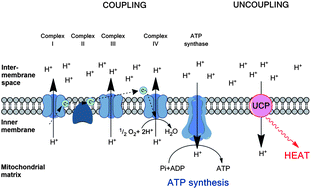Caffeine dose-dependently induces thermogenesis but restores ATP in HepG2 cells in culture
Abstract
Caffeine has been hypothesised as a thermogenic agent that might help to maintain a healthy body weight. Since very little is known about its actions on cellular energy metabolism, we investigated the effect of caffeine on mitochondrial oxidative phosphorylation, cellular energy supply and thermogenesis in HepG2 cells, and studied its action on fatty acid uptake and lipid accumulation in 3T3-L1 adipocytes at concentrations ranging from 30–1500 μM. In HepG2 cells, caffeine induced a depolarisation of the inner mitochondrial membrane, a feature of mitochondrial thermogenesis, both directly and after 24 h incubation. Increased concentrations of uncoupling protein-2 (UCP-2) also indicated a thermogenic activity of caffeine. Energy generating pathways, such as mitochondrial respiration, fatty acid oxidation and anaerobic lactate production, were attenuated by caffeine treatment. Nevertheless, HepG2 cells demonstrated a higher energy charge potential after exposure to caffeine that might result from energy restoration through attenuation of energy consuming pathways, as typically found in hibernating animals. In 3T3-L1 cells, in contrast, caffeine increased fatty acid uptake, but did not affect lipid accumulation. We provide evidence that caffeine stimulates thermogenesis but concomitantly causes energy restoration that may compensate enhanced energy expenditure.

- This article is part of the themed collection: First International Congress on Cocoa, Coffee and Tea

 Please wait while we load your content...
Please wait while we load your content...